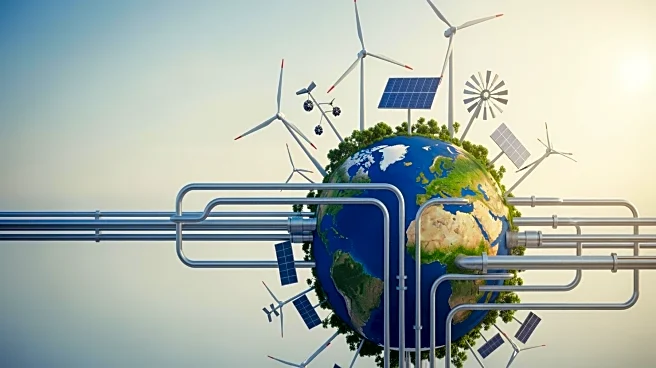What's Happening?
Petroleum Minister Hardeep Singh Puri has announced significant developments in India's energy strategy, emphasizing a four-pronged approach to ensure energy security, affordability, and sustainability.
This strategy includes diversifying crude oil imports, increasing domestic exploration of oil and gas, and transitioning to cleaner energy sources, such as the Green Hydrogen Mission. The minister highlighted that India has expanded its crude import basket from 27 to over 40 countries and opened 99% of its offshore area for exploration. These measures are part of India's efforts to build a self-sufficient energy future under Prime Minister Narendra Modi's leadership. The announcement comes amid a volatile global energy market, with India prioritizing the interests of its consumers in its import policies.
Why It's Important?
The expansion of India's energy strategy is crucial in the context of global energy volatility, particularly following the Russia-Ukraine conflict. By diversifying its crude oil sources and increasing domestic exploration, India aims to stabilize energy prices and secure supplies, which are vital for its economic growth and consumer protection. The shift towards cleaner energy, including the Green Hydrogen Mission, reflects India's commitment to sustainable development and reducing reliance on traditional fossil fuels. This strategy not only strengthens India's energy security but also positions it as a significant player in the global energy market, potentially influencing international energy dynamics.
What's Next?
India's ongoing discussions with the United States to deepen energy cooperation indicate potential future collaborations that could further diversify India's energy sources. As India continues to expand its energy procurement, it may explore new partnerships and technologies to enhance its energy infrastructure. The focus on clean energy transition suggests that India will likely invest in renewable energy projects and innovations, aligning with global sustainability goals. Stakeholders, including businesses and policymakers, will be closely monitoring these developments to assess their impact on India's energy landscape and international relations.
Beyond the Headlines
The ethical and environmental implications of India's energy strategy are significant, as the country balances economic growth with sustainability. The transition to cleaner energy sources, such as green hydrogen, could lead to long-term shifts in energy consumption patterns and reduce environmental impact. Additionally, India's approach to energy security may influence global energy policies, encouraging other nations to diversify their energy sources and invest in sustainable technologies. The cultural dimension of this transition is also noteworthy, as it reflects a growing awareness and commitment to environmental stewardship within Indian society.










